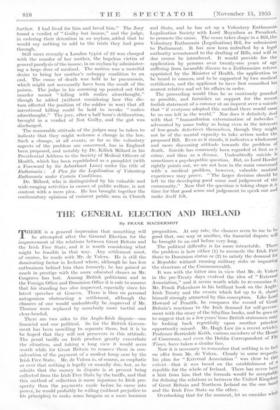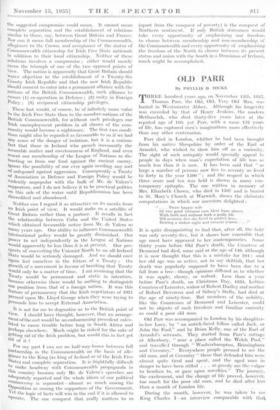THE GENERAL ELECTION AND IRELAND
By FRANK MACDERMOT
THERE is a general impression that something will be attempted after the General Election for the improvement of the relations between Great Britain and the Irish Free State, and it is worth considering what might be feasible in that way. Any settlement must, of course, be made with Mr. de Valera. He is still the dominating factor in Ireland where, although he has less enthusiasm behind him than formerly, he has gained as much in prestige with the more educated classes as Mr. Cosgrave has lost. Among British politicians and in the Foreign Office and Dominion Office it is safe to assume that his standing has also improved, especially since his latest speeches at Geneva. There is thus no personal antagonism obstructing a settlement, although the chances of one would undoubtedly be .improved if Mr. Thomas were replaced by somebody more tactful and clear-headed.
There are two sides to the Anglo-Irish dispute—one financial and one political. So far the British Govern- ment hai been unwilling to separate them, but it is to be hoped that they will not persevere in this attitude. The penal tariffs on Irish produce greatly exacerbate the situation, and taking a long view it would seem worth while for Great Britain to remove them in con- sideration of the payment of a modest lump sum by the Irish Free State. Mr. de Valera is, of course, as emphatic 'as ever that nothing is legally or morally due, but, as he admits that the money in dispute is at present being collected from the Irish Free State by the tariffs, and that this method of collection is more injurious to Irish pro- sperity than the payments made before he came into power, he would probably he willing (without prejudice to • his principles) to make some bargain as a mere business proposition.. At any rate, the chances seem to me to be good that, one way or another, the financial dispute will be brought to an end before very long. The political difficulty is far more intractable. There the problem is how either (1) to reconcile the Irish Free State to Dominion status or (2) to satisfy the demand for a Republic without running military risks or impairing the structure of the Commonwealth.
It was with the latter aim in view that Mr. de Valera in the pre-Treaty days evolved the idea of " External Association," and it seems worth while to re-examine it' Mr. Frank Pakenham in his brilliant book on the Angle- Irish Treaty and the events which led up to it, shows himself strongly attracted by this conception. Like Lord Howard of Penrith, he compares the record of Great Britain's reactions to the Irish demand for self-govern' ment with the story of the Sibylline books, and he goes on to suggest that in a few years' time British statesmen maY be looking back regretfully upon another priceless. opportunity missed. Mr. Hugh Law (in a recent article), Professor Berriedale Keith, various members of the House of Commons, and even the Dublin Correspondent of The Times, have taken a similar line. Now it is necessary to remember that nothing is in fart on offer from Mr. de Valera. Cloudy in some respects, his plan for " External Association." was clear to this extent—that it was based on the establishment of a republic for the whole of Ireland. There has never boa a hint from him that the formula would be acceptable for defining the relations as between the United Kingdom of Great Britain and Northern Ireland on the one halal and the Irish Free State on the other. • • Overlooking that for the moment, let us consider whet the suggested compromise could mean. It cannot mean complete' separation and the establishment of relations similar to those, say, between Great Britain and France. Nor can it mean full membership of the Commonwealth, allegiance to the Crown, and acceptance of the .status of Gommonwealth citizenship for Irish Free State nationals in addition to their local citizenship. Neither of these solutions involves a compromise ; either would merely mean the triumph of One, of the two opposed points of view. The notion is aPparently that Great Britain should Waiye objection to the establishment of a Twenty-Six GOunty Irish Republic and that the new Irish Republic should consent to enter into a permanent alliance with the liations of the British Commonwealth, such alliance to ensure (1) co-operation in Defence ; (2) unity in Foreign Policy ; (3) reciprocal citizenship privileges.
• These last would, of course, be of infinitely more value to the Irish Free State than to the member-nations of the I3ritish Commonwealth, for without such privileges our Irish unemployment problem in all classes of the com- munity would become a nightmare. The first two condi- tions might also be regarded as favourable to us if we had any sense of the danger of isolation, but it is a curious fact that those in Ireland who preach incessantly the incurable malice and covetousness of England, and even -resent our membership of the League of Nations as dis- tracting us from our feud against the ancient enemy, ignore the possibility of our ever again needing. any sort 9f• safeguard against aggression. Consequently a Treaty of Association in Defence and Foreign Policy would be !violently ...unpopular with the bulk of Mr. de Valera's • suPPorters, and I do not believe it to be practical politics on this side of • the water until Republicanism has been discredited and abandoned.
Neither can I regard it as attractive on its merits from all Irish point of view. It would make us a satellite of Great Britain rather than a partner. It recalls in fact the relationship between Cuba and the United States Which obtained favourable notice from Mr. de Valera so marry years ago. Our ability to influence Commonwealth international policy would be greatly diminished. Our Power to act independently in the League of Nations Would apparently be less than it is at present. Our pro- sheets of converting the Unionist North to an all-Ireland State would be seriously damaged. And we should once .again feel Ourselves in the fetters of a Treaty ; the growth of a movement in favour of breaking that Treaty would only be a matter of time. I am assuming that the Treaty would be permanent and static in intention, because otherwise there 'would be nothing to distinguish our position from that of a foreign nation. It was this feature of permanency that the Irish negotiators of 1921 Pressed upon 'Mr. Lloyd George when they were trying to Persuade him to accept External Association.
It is not for me to dogmatise as to the British point of View. I should have thought, however, that an arrange- raent of the sort would be an embarrassing precedent calcu- lated to cause trouble before long in South Africa and Perhaps elsewhere. Much might be risked for the sake of netting rid bf the Irish problem,' but would this in fact get of it ?
r or my part I can sec no half-way-house between full Partnership in the Commonwealth on the basis of alle- 4iance to the King (as king of Ireland or of the Irish Free State) and complete separation. It is. frightfully difficult tc) make headway with Commonwealth propaganda in this country because only Mr. de Valera's speeches , are adequately reported and the whole idiom of our political controversy is separatist—almost as much among the °,,PPosition as among the supporters of the Government. et the logic of facts• will win in the end if it is allowed to oPerate. The one conquest that really matters to us (apart from the conquest of poverty) is the conquest of Northern sentiment. If only British statesmen would take every opportunity of emphasising our freedom to choose between membership and non-membership Of the Commonwealth and every opportunity of emphasising the freedom of the North to choose between its present ,status and union with the South in a Dominion of 'Ireland, much might 'be accomplished.











































 Previous page
Previous page